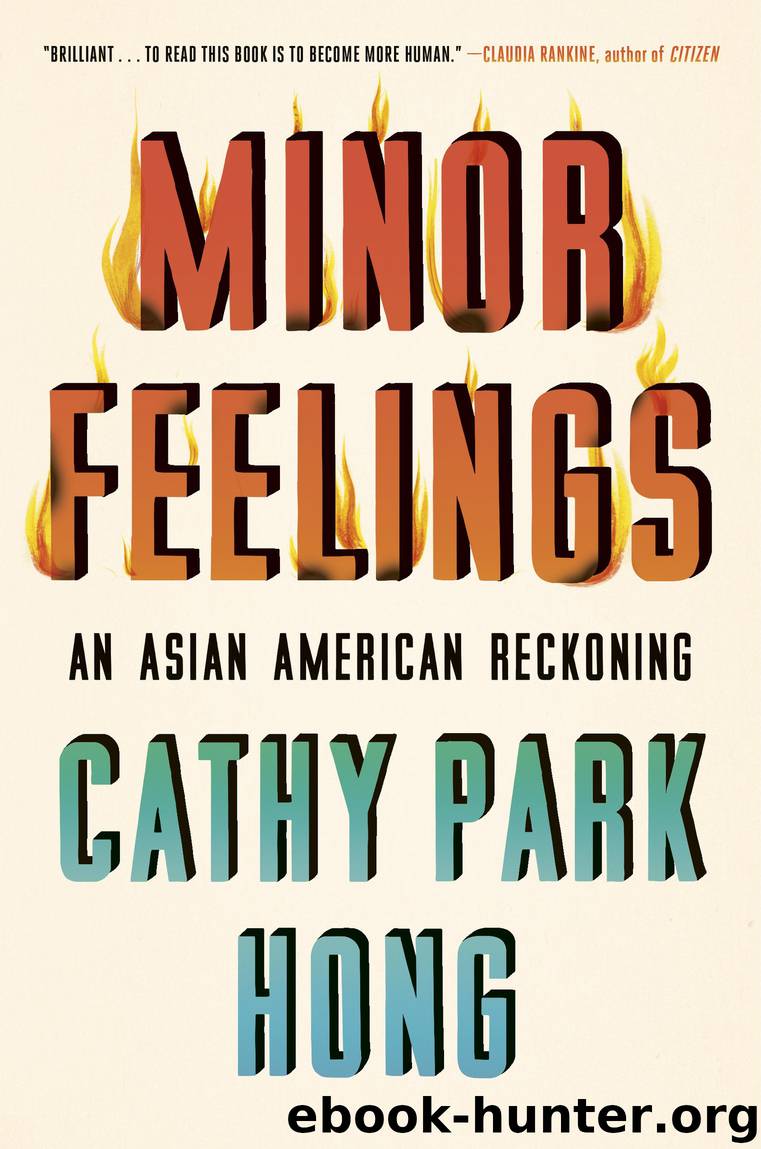Minor Feelings by Cathy Park Hong

Author:Cathy Park Hong
Language: eng
Format: epub
Publisher: Random House Publishing Group
Published: 2020-02-24T16:00:00+00:00
I turned to the modular essay because I am only capable of “speaking nearby” the Asian American condition, which is so involuted that I can’t stretch myself across it. The more I try to pin it, the more it escapes my grasp. I tried to write about it as a lyric poem, but the lyric, to me, is a stage, a pedestal from which I throw my voice to point out what I’m not (the curse of anyone nonwhite is that you are so busy arguing what you’re not that you never arrive at what you are). I admit that I sometimes still find the subject, Asian America, to be so shamefully tepid that I am eager to change it—which is why I have chosen this episodic form, with its exit routes that permit me to stray. But I always return, from a different angle, which is my own way of inching closer to it.
If I’m going to write nearby my Asian American condition, however, I feel compelled to write nearby other racial experiences. Students have asked me, “How do I write about racial identity without always reacting to whiteness?” The automatic answer is “Tell your story.” But this too can be a reaction to whiteness, since white publishers want “the Muslim experience” or “the black experience.” They want ethnicity to be siloed because it’s easier to understand, easier to brand. Ever since I started writing, I was not just interested in telling my story but also in finding a form—a way of speech—that decentered whiteness. I settled on bad English because, as the artist Gregg Bordowitz said about radical art, it bypasses social media algorithms and consumer demographics by bringing together groups who wouldn’t normally be in the same room together.
You can’t tweet bad English. If I tweeted a line from my poem, it would sink like a lead balloon. Bad English is best shared offline, in a book or performed live; it’s an interactive diction that must be read aloud to be understood, but even if I don’t quite understand it, those chewy syllables just feel familial to me, no matter the cultural source, which is why it brings together racial groups outside whiteness. But bad English is a dying art because the Internet demands we write clear, succinct poems that stop us mid-scroll. If you want to truly understand someone’s accented English, you have to slow down and listen with your body. You have to train your ears and offer them your full attention. The Internet doesn’t have time for that.
So as long as it lasts, I want to write nearby Rodrigo Toscano, who pulls his Spanglish phonetic syllables apart like taffy (“tha’ vahnahnah go-een to keel joo”) or LaTasha N. Nevada Diggs, who recombines black slang, Japanese, Spanish, Chamorro, and Tagalog into a remastered Afro-Futurist song (“…bubblegum kink / a Sheik’s interloper. / A radical since 1979. / a brujo. A tommy gun. A werewolf.”). I can’t speak for the Latinx experience, but I
Download
This site does not store any files on its server. We only index and link to content provided by other sites. Please contact the content providers to delete copyright contents if any and email us, we'll remove relevant links or contents immediately.
| African-American Studies | Asian American Studies |
| Disabled | Ethnic Studies |
| Hispanic American Studies | LGBT |
| Minority Studies | Native American Studies |
Cecilia; Or, Memoirs of an Heiress — Volume 1 by Fanny Burney(31374)
Cecilia; Or, Memoirs of an Heiress — Volume 3 by Fanny Burney(30968)
Cecilia; Or, Memoirs of an Heiress — Volume 2 by Fanny Burney(30922)
The Great Music City by Andrea Baker(22332)
We're Going to Need More Wine by Gabrielle Union(18108)
Bombshells: Glamour Girls of a Lifetime by Sullivan Steve(13138)
Pimp by Iceberg Slim(12972)
All the Missing Girls by Megan Miranda(12810)
Fifty Shades Freed by E L James(12478)
Talking to Strangers by Malcolm Gladwell(11946)
Norse Mythology by Gaiman Neil(11937)
Crazy Rich Asians by Kevin Kwan(8391)
Mindhunter: Inside the FBI's Elite Serial Crime Unit by John E. Douglas & Mark Olshaker(7873)
The Lost Art of Listening by Michael P. Nichols(6508)
Enlightenment Now: The Case for Reason, Science, Humanism, and Progress by Steven Pinker(6432)
Bad Blood by John Carreyrou(5799)
The Four Agreements by Don Miguel Ruiz(5550)
Weapons of Math Destruction by Cathy O'Neil(5072)
We Need to Talk by Celeste Headlee(4902)
